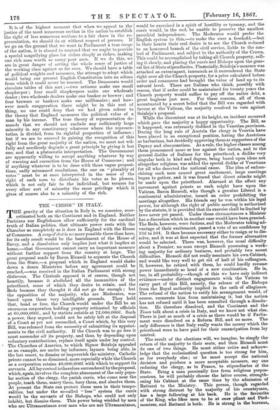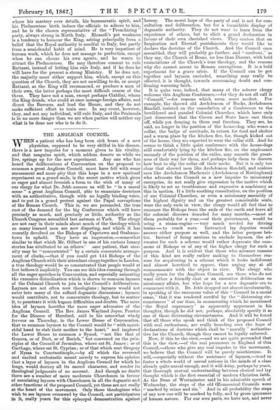THE " CRISIS " IN ITALY.
HE gravity of the situation in Italy is, we conceive, over- estimated both on the Continent and in England. Neither T es Parisians nor Englishmen allow sufficiently for the cardinal truth of Italian politics, that ultimate power rests with the Chamber as completely as it does in England with the House of Commons. A coup d'etat is no more possible there than here, for its only result would be the banishment of the House of Savoy, and a dissolution only implies just what it implies at home,—that Government cannot carry an important measure without further support from the country at large. The great proposal made by Baron Ricasoli to separate the Church from the State,—a proposal which in England would shake down a dozen Ministries before any agreement could be reached,—was received in the Italian Parliament with strong disfavour. The Clericals opposed it of course, though not heartily, because it abolished all the immunities of the priesthood, some of which they desire to retain, and the Reds because they thought it did not go far enough ; but the opposition of the majority, who are Moderates, was based upon these very intelligible grounds. They held that, bond or free, the Church would under the Bill be an enormous corporation holding property estimated by officials at 60,000,0001., and by statists outside at 72,000,0001. Such a power, they argued, could not be safely left at the disposal of a Court as yet not reconciled, a Court which, by this very Bill, was released from the necessity of submitting its appoint- ments to the civil authority. If the Church was to go free it must surrender all its property, and thus, by depending upon voluntary contributions, replace itself again under lay control.
• The Churches of America, to which Signor Scialoja appealed as an example, are under lay influence, laymen being able, in the last resort, to dismiss or impoverish the ministry. Catholic priests cannot be so dismissed, more especially while the Church as a corporation retains 40,000,0001. with which to support its servants. All lay control is therefore surrendered by theproposal, which, again, involves the complete abasement of the only popu- lar section of the clergy, the parish cures, who come near the people, teach them, marry them, bury them, and absolve them. At present the State can protect these men in their tempo- ralities, but under the so-called " free " system the cures would be the servants of the Bishops, who could not only inhibit, but dismiss them. This power being wielded by men who are Ultramontanes over men who are not Mtramontanes, would be exercised in a spirit of hostility or tyranny, and the cures would, in the end, be unable to preserve the smallest parochial independence. The Moderates would prefer the English system to this,—to make the cure a freehold,—but in their hearts their real desire is to see the Church reduced to an honoured branch of the civil service, liable to the con- trol of Parliament, and subject to the authority of the Crown. This could be accomplished by taking all Church property, sell- ing it slowly, and placing the cures and Bishops upon the gene- ral list of State stipendiaries. Financially, Scialoja's measure was attacked as extravagant, inasmuch as it surrendered the State- right over all the Church property, for a price calculated before order and commerce had brought the value of land up to its
natural level. There are Italians who think, possibly with reason, that if order could be maintained for twenty years the Church property would suffice to pay off the entire debt, a, great bugbear just now. For these reasons, all of 'them accentuated by a secret belief that the Bill was regarded with favour at the Vatican, the majority resolved to vote against Scialoja's proposal.
While the discontent was at its height, an incident occurred which gave the majority a happy opportunity. The Bill, as it happened, was extremely disliked in the Venetian provinces- During the long rule of Austria the clergy in Venetia have been placed in an exceptional position, hating the Austrians, as barbarians, but decidedly approving them as supporters of the Papacy and obscurantism. As a rule, the higher classes among them pronounced more or less against the nation, and to the general dislike of Italians for the priesthood, a dislike very singular both in kind and degree, being based upon ideas not altogether religious, was added the special dislike of Venetians for all who deserted the national cause. The idea of enfran- chising such men caused great excitement, large meetings- began to gather, and it was feared that direct attacks might be made upon the priesthood. Alarmed at the effect any movement against priests as such might have upon the- Vatican, Baron Ricasoli, who though a genuine Liberal is a continental administrator, issued an order prohibiting the meetings altogether. His friends say he was within his legal power, for although the right of public meeting is authorized by the statute, it is provided that its exercise shall be limited by- laws never yet passed. Under those circumstances a Minister has a discretion which in another case would have been granted.
The Reds, however, were furious, and the Moderates taking ad- vantage of their excitement, passed a vote of no confidence by
136 to 104. It then became necessary either to resign or to dis- solve, and it was at first expected that the former alternative- would be selected. There was, however, the usual difficulty about a Premier, no man except Ricasoli possessing a work- ing majority for ordinary business, and probably two secret difficulties. Ricasoli did not really nominate his own Cabinet,
and would like very well to get rid of half of his colleagues. If, however, he retired with them, he could hardly resume
power immediately as head of a new combination. He is,. too, in all probability—though of this we have only indirect evidence—under distinct engagements with the Vatican to- carry part of this Bill, namely, the release of the Bishops- from the Royal authority implied in the oath of allegiance. The refusal of the nation to ratify his arrangement would, oU course, exonerate him from maintaining it, but the nation, has not refused until it has been consulted through a dissolu- tion. He therefore dissolved, and the Continent and the- Times talk about a crisis in Italy, and we know not what else.. There is just as much of a crisis as there would be if Parlia- ment were dissolved on a Reform Bill, and no more. The only difference is that Italy really wants the money which the priesthood were to have paid for their emancipation from lay control.
The result of the elections will, we imagine, be simply the return of the majority to their seats, and then Ricasoli must do one of two things. He must either retire and acknow- ledge that the ecclesiastical question is too strong for him, as for everybody else ; or he must accept the national decision and produce a more acceptable measure, say one reducing the clergy, as in France, to stipendiaries of the State. Being a man personally free from religious prepos- sessions, he will probably choose the latter course, strength- ening his Cabinet at the same time by the admission of Rattazzi to the Ministry. This person, though regarded with strong distrust by the majority of his countrymen, has a large following at his back. He is the favourite of the King, who likes men to be at once pliant and Pied- montese, and Rattazzi is both. He is strong in the bureaus,.
where his mastery over details, his bureaucratic spirit, and his Piedmontese birth induce the officials to adhere to him, and he is the chosen representative of the " Frenchizing " party, always strong in North Italy. Ricasoli's pet weakness is a tendency to humour the King, arising principally from a belief that the Royal authority is needful to Italy, but partly from a semi-feudal habit of mind. He is very impatient of bureau work, which he does not manage to perfection, except when he can choose his own agents, and he wants to attract the Piedmontese. He may therefore consent to rule Rattazzi, instead of letting him rule Italy, and if he does he will have for the present a strong Ministry. If he does not, the majority must either support him, which, except on this question of the March, they are not unwilling to do, or accept Rattazzi, as the King will recommend, or produce a man of their own, the latter perhaps the most difficult course of the three. They have not a man, except perhaps Cialdini, whom the King dreads, who could at once manage foreign affairs, and direct the Bureaus, and lead the House, and they do not make sufficient effort to train one. In any event, however, they, and not any individual, will rule Italy, and the Peninsula is m no more danger than we are when parties will neither say Ithat is be done nor who is to do it.































 Previous page
Previous page